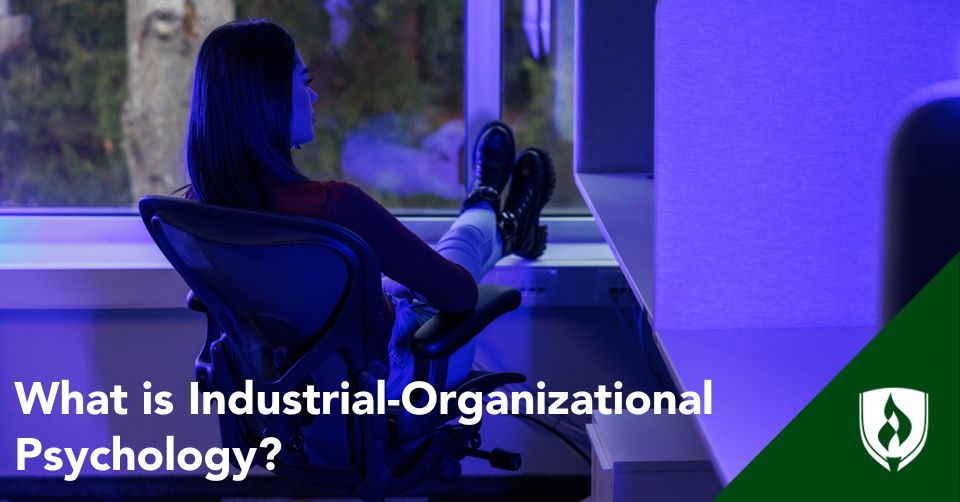
Industrial-organizational psychology—often called I-O psychology or I/O psychology—is the study of human behavior in the workplace. It uses psychological principles to understand how people think, feel and act on the job.
“I/O psychologists help organizations solve problems by focusing on how people work, what motivates them and how systems can improve,” says Elle O’Keeffe, instructor in Rasmussen University's Business program. “Their work supports everything from hiring and training to employee satisfaction and productivity.”
Why does this matter? Because businesses rely on people.
And when employees feel supported, motivated and understood, they do better work. I-O psychology helps companies build stronger teams, improve job satisfaction and solve problems that affect performance.
From hiring smarter to supporting mental health, I-O psychology plays a growing role in today’s workplace.
Understanding the basics of I-O psychology
I-O psychology combines two branches of applied psychology: industrial psychology and organizational psychology. Together, they focus on studying human behavior in the workplace to help organizations run better and support employees.
It can get a little heady—so here’s an example of something an I/O psychologist might work on, according to O’Keffee.
Let’s say a hotel and resort chain named Axura has noticed a spike in turnover among their front desk and housekeeping staff. Turnover is a pricey problem, and since the issue was widespread, over multiple locations, Axura leadership decides to bring in an industrial and organizational psychologist named Tessa to help.
After conducting surveys, interviews and productivity assessments, Tessa introduces flexible schedules, better training and a refreshed employee recognition program. Within six months, job satisfaction rises by 30% and productivity improves by 20%.
Tessa’s role as an I/O psychologist focused on solving staff burnout and turnover in this case. By assessing productivity and conducting surveys and interviews, she helped leadership implement changes that boosted both morale and output.
The union of organizational psychology and industrial psychology
Industrial psychology is often about the systems that support people at work. It covers things like hiring practices, job analysis, employee training and performance measurement. The goal is to match the right people to the right jobs and help them succeed.
Organizational psychology looks more closely at the social side of work. This includes things like motivation, leadership, team dynamics and overall workplace culture. It helps organizations understand how behavior and attitudes affect productivity and satisfaction.
I-O psychology as a field began in the early 20th century and grew out of both psychology and business. Today, it applies research-backed psychological principles to real-world workplace problems. Whether it’s improving employee performance or shaping leadership development programs, I-O psychologists focus on making workplaces more effective and supportive. 2
Important areas of industrial and organizational psychology
This branch of psychology can go in many different directions. Like any other area of psych, there are clinical applications, as well as research roles.
In the business world, in terms of I-O consulting, there are some important areas I-O psych tends to focus on.
Recruitment
Finding the right person for the right role in today’s chaos of hiring is no easy task. (For more on that, check out What is an ATS? Everything Job Seekers Need to Know.)
Sometimes organizations need more than a great recruiter to attract candidates. I-O psychologists can help companies understand how to make their job offers more competitive, reach the right people, train and retain them.
Onboarding and retraining
Many companies rely on I-O psychologists to create or improve training programs. These programs can help new hires get up to speed faster or support long-time employees as they learn new skills.
Performance measurement and evaluation
Creating fair and effective performance evaluation systems is another core responsibility for I-O psychologists, according to O’Keeffe.
“These systems help employees understand what’s expected of them and give managers a better way to make informed decisions.”
I-O psychologists help measure job performance and find ways to boost productivity. They might design fair performance reviews or help leaders set clear goals for teams.
Employee motivation
“I-O psychologists study workplace behavior to understand what drives employee engagement and job satisfaction,” O’Keeffe says. “They use surveys, interviews and observation to recommend changes that lead to more motivated, productive teams.”
The workplace environment
I-O psychologists help design policies and programs that reduce burnout, improve communication and encourage healthier work habits. This might include flexible work schedules, stress management training or clearer pathways for conflict resolution.
They may also work with human resources teams to promote cultural awareness and inclusion training to help companies support employees from all backgrounds. By improving emotional and psychological safety, organizations can create environments where employees thrive.
Legal and ethical concerns
I-O psychology also plays a role in shaping workplace policies that align with labor laws and public health guidelines. From preventing discrimination to ensuring fair hiring practices, these professionals help companies stay both ethical and effective.
This isn't just about offering perks—it’s about creating lasting systems that value human behavior and support employee success.
Change management
When businesses go through change, like growing fast or restructuring, I-O psychologists can guide leadership through the transition. They use tools like data analysis and employee surveys to understand what’s working and what needs improvement.
Where I-O psychologists work
Industrial-organizational psychologists work in many different places depending on their focus. Some work directly for large companies to help improve hiring, training and team performance. Others join consulting firms, where they partner with many types of businesses to solve workplace challenges.
Government agencies also hire I-O psychologists to support worker well-being and develop fair hiring practices. In academia, these professionals may teach or conduct research that helps organizations better understand human behavior.
Whether in human resources, education or public service, I-O psychologists use research and data to help organizations work smarter and support their people.
Why study I-O psychology?
If you’re interested in understanding how people work—and how workplaces can work better—industrial-organizational psychology could be a strong fit. Only note, careers in IO psychology take a great deal of education. A bachelor's degree is only the start of that career path. Jobs will typically require a master’s degree and in many cases, a doctoral degree.1
Studying industrial and organizational psychology builds knowledge in human behavior and personality traits, data analysis and organizational development. You’ll learn how to assess challenges, design solutions and support healthier, more productive workplaces.
Whether you’re just beginning your education or looking to develop new career skills, this subject has a lot to offer.3
Industrial organizational psychology can be useful in many fields
By applying psychological principles to real-world challenges, I-O psychology professionals help build stronger organizations and healthier, more supportive workplaces. If you’re interested in their research, do some digging, it’s fascinating.
Or if you’re interested in studying I-O psychology full time, check out How to Become an Industrial Organizational Psychologist.
On top of all this, if you find the topic fascinating, but are more interested in the business applications, know that I-O psychology has special relevance to human resources careers. Check out What Can You Do With a Human Resources and Organizational Leadership Degree? to see how they connect.
1U.S. Bureau of Labor Statistics. (2024). Psychologists: Occupational outlook handbook.https://www.bls.gov/ooh/life-physical-and-social-science/psychologists.htm
2American Psychological Association. (n.d.). Industrial and organizational psychology. Viewed August 11, 2025, from https://www.apa.org/ed/graduate/specialize/industrial
3Rasmussen University does not offer any programs at the undergraduate or graduate level in Industrial-Organizational Psychology




